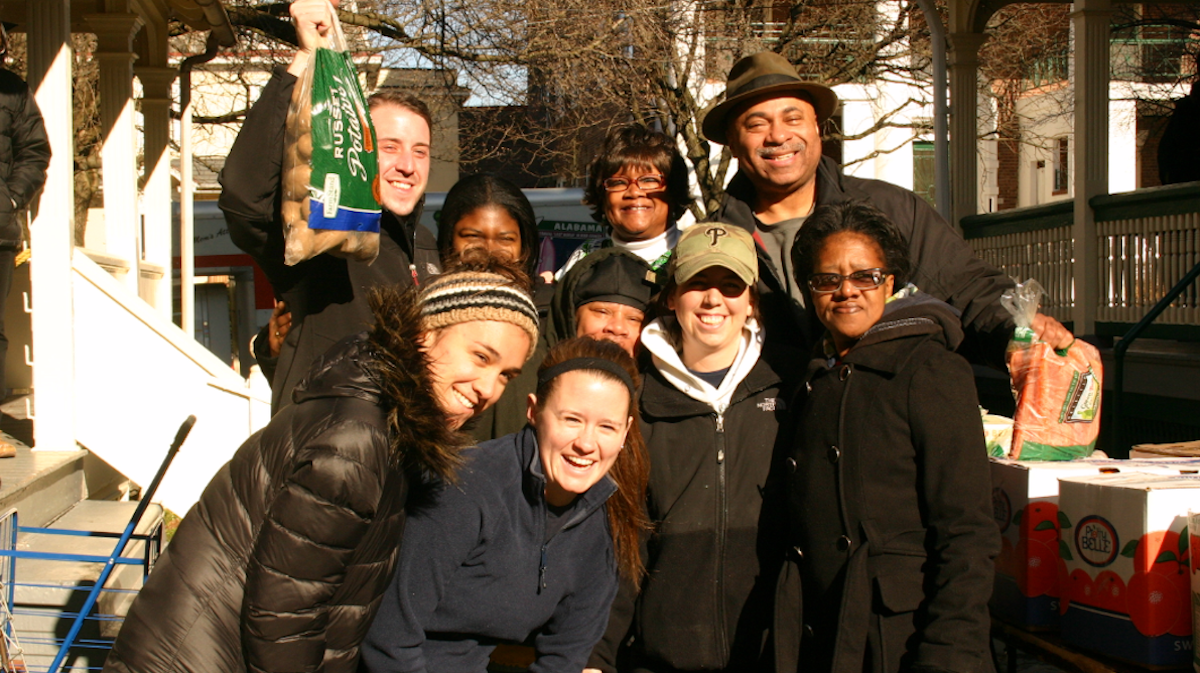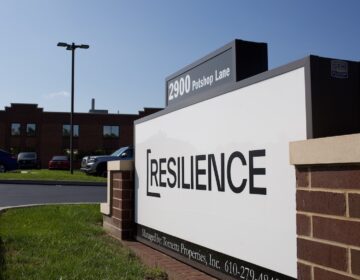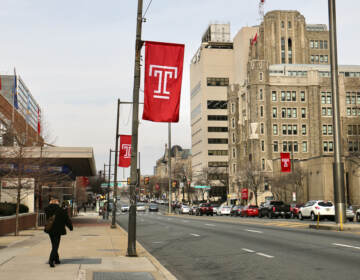Anti-hunger network sprouts from a former Northwest Philly food desert

This Easter food drive ultimately led to the formation of the Germantown Hunger Network. (Photo courtesy of Tom Wingert)
Thanks to La Salle University’s Exploring Nutrition project, Tom Wingert has set his sights on helping families in Northwest Philadelphia with the launch of the new Germantown Hunger Network.
Wingert may be just 25 years old, but while the Philly native earns his La Salle MBA in Management and Leadership, he’s also involved in program development with the Leadership and Global Understanding program.
An academic minor open to all departments, LGU students study civic leadership and social justice issues on the local, national and global stage, and make at least three 10-day service trips to foreign countries.
Combating hunger
In partnership with the Exploring Nutrition project, which is now in its second year, many LGU students have become involved in local anti-hunger initiatives.
These have been a natural outgrowth of the 2009 opening of the La Salle Fresh Grocer store in “one of the largest food deserts in Philadelphia,” according to Exploring Nutrition Director Marjorie Allen.
Exploring Nutrition pioneers a model for urban universities to partner with local businesses and community and religious groups to aid neighbors’ access to healthy food.
Its initiatives are a natural fit for socially-minded LGU students.
Last spring, the Exploring Nutrition project joined LGU students and leaders, the Fresh Grocer and an array of community groups and churches for an Easter food drive that fed nearly 2,000 people.
However, Wingert and 2013 LGU graduate Jessica Orapallo wanted to do more.
Communication needed
“We realized as we were visiting all these churches, and talking with all these people, that there were a lot of organizations in this neighborhood that were addressing hunger and nutrition issues,” Wingert explained, “but none of them were necessarily working together.”
As Allen put it, “People were doing wonderful things, but were not as effective as they could be because they were not aware of what other people were doing.”
That lack of dialogue inspired Wingert, Orapallo and their partners to help existing organizations keep in touch by founding the Germantown Hunger Network under the umbrella of La Salle’s LGU minor and the Exploring Nutrition project.
Networking efforts lead to Germantown
Wingert decided to “wear down a little bit of shoe leather,” asking for meetings with local leaders in Germantown and the greater Philadelphia area to discuss the successes, challenges, future plans and scalability of regional programs to address hunger.
Invitations went out to Philadelphia’s Common Market, St. Christopher’s Foundation, MANNA, The Food Trust, Germantown United CDC (GUCDC), Philabundance and many others.
Wingert said the Germantown response was especially enthusiastic. As a near neighbor to La Salle with a strong civic network already in place, it was an ideal target for the new initiative.
While he hopes the Germantown Hunger Network could eventually be adapted for other neighborhoods, Wingert is focusing there for now because “Germantown is probably the area [where] I found the most active civic life.”
For example, a meeting with Wyck House Programs and Outreach Manager Bob McKee yielded connections to three other locals who were interested in getting involved.
“I wasn’t finding as much of a strong exponential growth factor” in other parts of the city, Wingert continued. “The civic society is so strong in Germantown, and there are so many people who are committed to revitalizing that community, so many active soup kitchens and food pantries.”
On June 21, the Germantown Hunger Network’s first official meeting was held on campus. Representatives from St. Christopher’s, GUCDC, Wyck House, the Germantown Historical Society, Philabundance and many others attended.
Response to challenging cuts
With cuts to the federal government’s Supplemental Nutrition Assistance Program benefits looming this November, as a 2009 increase in the benefits expires without action from Congress, civic efforts to combat hunger are becoming more important than ever, Wingert noted.
“When government — be it city, state or federal — is going to make it a little more difficult to help the people that need the most help, [it’s grassroots organizers] that are going to be responsible for stepping up and making sure something happens,” he added.
Allen, Wingert and their La Salle and Fresh Grocer partners hope that the Germantown Hunger Network can be a new way for those activists to stay connected.
Wingert outlined hopes for local soup kitchens and food pantries previously unconnected in their operations to hold monthly or biweekly meetings for, among other things, resource sharing and best-practice dialogues.
“We have all the people who are dedicated to making this neighborhood a better place in the same room. Who knows what could come out of it?” he asked. “With enough social and political capital, we might be able to get some policy work done, long-term.”
Said Allen, “To make real changes you have to work in partnership with the community. We’re really happy this is happening. We think it’s vitally needed and we’re very pleased to be a part of it.”
Wingert said the Germantown Hunger Network meeting hopes to hold its second meeting in mid-September.
Correction: Wingert’s level of LGU involvement has been updated since this story initially posted.
WHYY is your source for fact-based, in-depth journalism and information. As a nonprofit organization, we rely on financial support from readers like you. Please give today.




